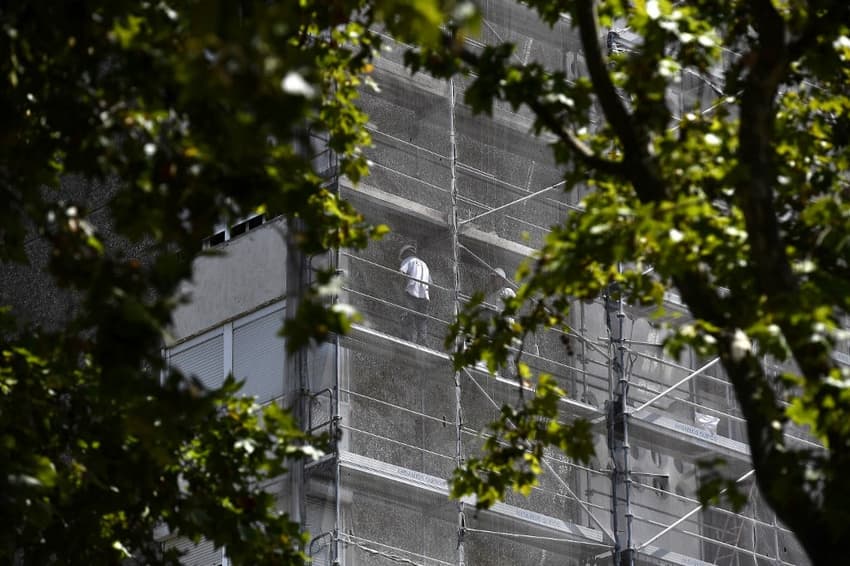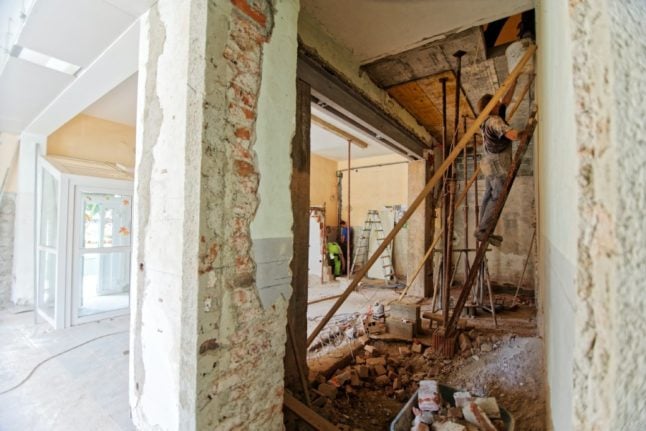Reader question: Has Italy's 'superbonus 110' been scrapped?

The Italian government has announced sweeping changes to the country's popular building superbonus scheme, but does this mean funding is no longer available at all? Here's what you need to know.
Question: I’m currently renovating my Italian property and plan to use the ‘superbonus 110’ discount from the Italian government. I’ve read in a UK newspaper that Italy has just scrapped the superbonus. Is this true, and if so can I no longer claim it?
This is partially correct - you’re unlikely to be able to begin a new renovation project using the building 'superbonus' now, as Italy's government has just made a major change to the scheme which makes it inaccessible to most people.
Until last week there were three ways of claiming the funding, but following a hastily-approved amendment on Thursday now there’s only one - via a tax deduction (detrazione fiscale), which is only available to those who pay higher rates of income tax (Irpef). This effectively means the superbonus is now only open to the highest-earning Italian taxpayers.
The first thing to know however is that the rule change does not apply retroactively to projects which are already underway.
EXPLAINED: How Italy has changed its building superbonus - again
So you should be able to continue if you’ve already begun your claim for the superbonus under any of the three routes previously available: trading tax credit (cessione del credito), choosing to receive a discount on the invoice (sconto in fattura), or deduction from future income tax bills (detrazione fiscale). You can read a more detailed explanation of how this works here.
However this will depend on exactly what stage you are at with your claim. A qualified geometra (surveyor) or the building firm overseeing your renovation project should be able to confirm whether and how this could change anything in your situation.
So while the superbonus hasn’t been scrapped entirely, it is now so tightly restricted that new claims will be impossible for most.

After undergoing major changes in early January, Italy’s superbonus has been re-modelled once again. Photo by Milivoj Kuhar on Unsplash
There have already been various other recent changes to and problems with the superbonus scheme which stopped many homeowners from either making new claims or completing existing projects in recent months.
The availability of the superbonus was limited from the end of 2022 when long-planned changes came into effect preventing many people who had previously been eligible from claiming, including second-home owners. The maximum amount of funding available was also cut from 110 percent to 90 percent at this point, effectively turning it into the 'superbonus 90'
While these generous amounts of state funding understandably drew international media attention, in reality many homeowners in Italy using the superbonus found that the maximum amount of funding was only available in rare cases - usually to those paying the highest rates of tax - and everyone else would be more likely to get a deduction of between 50-70 percent.
Still not a deal to be sniffed at, the superbonus proved immensely popular - so popular in fact that it resulted in a building boom leading to a nationwide shortage of building companies available to carry out the work. This plus a shortage of building supplies, which was further exacerbated by the war in Ukraine, meant the cost of labour and materials soared - making many projects unviable even with the hefty rebates.
READ ALSO: How Italy’s building bonuses are delaying the renovation of cheap homes
These shortages also resulted in major delays to many projects, as did another rule change which made it harder for building companies to obtain the credit they needed to begin work. This blocked credit transfers causing delays to projects and uncertainty which, readers tell us, meant they had to cancel their plans or in some cases has not yet been resolved.
So while it was technically available, many people found themselves unable to actually use the building superbonus in 2022.
But if you already have a claim underway, the latest government rule change looks unlikely to cause any further problems on top of those already faced by homeowners.
Please note that The Local cannot advise on individual cases. For more information on claiming Italy’s building bonuses, homeowners are advised to consult a qualified Italian building surveyor or independent financial advisor.
See more in our Italian property section.
Comments
See Also
Question: I’m currently renovating my Italian property and plan to use the ‘superbonus 110’ discount from the Italian government. I’ve read in a UK newspaper that Italy has just scrapped the superbonus. Is this true, and if so can I no longer claim it?
This is partially correct - you’re unlikely to be able to begin a new renovation project using the building 'superbonus' now, as Italy's government has just made a major change to the scheme which makes it inaccessible to most people.
Until last week there were three ways of claiming the funding, but following a hastily-approved amendment on Thursday now there’s only one - via a tax deduction (detrazione fiscale), which is only available to those who pay higher rates of income tax (Irpef). This effectively means the superbonus is now only open to the highest-earning Italian taxpayers.
The first thing to know however is that the rule change does not apply retroactively to projects which are already underway.
EXPLAINED: How Italy has changed its building superbonus - again
So you should be able to continue if you’ve already begun your claim for the superbonus under any of the three routes previously available: trading tax credit (cessione del credito), choosing to receive a discount on the invoice (sconto in fattura), or deduction from future income tax bills (detrazione fiscale). You can read a more detailed explanation of how this works here.
However this will depend on exactly what stage you are at with your claim. A qualified geometra (surveyor) or the building firm overseeing your renovation project should be able to confirm whether and how this could change anything in your situation.
So while the superbonus hasn’t been scrapped entirely, it is now so tightly restricted that new claims will be impossible for most.

There have already been various other recent changes to and problems with the superbonus scheme which stopped many homeowners from either making new claims or completing existing projects in recent months.
The availability of the superbonus was limited from the end of 2022 when long-planned changes came into effect preventing many people who had previously been eligible from claiming, including second-home owners. The maximum amount of funding available was also cut from 110 percent to 90 percent at this point, effectively turning it into the 'superbonus 90'
While these generous amounts of state funding understandably drew international media attention, in reality many homeowners in Italy using the superbonus found that the maximum amount of funding was only available in rare cases - usually to those paying the highest rates of tax - and everyone else would be more likely to get a deduction of between 50-70 percent.
Still not a deal to be sniffed at, the superbonus proved immensely popular - so popular in fact that it resulted in a building boom leading to a nationwide shortage of building companies available to carry out the work. This plus a shortage of building supplies, which was further exacerbated by the war in Ukraine, meant the cost of labour and materials soared - making many projects unviable even with the hefty rebates.
READ ALSO: How Italy’s building bonuses are delaying the renovation of cheap homes
These shortages also resulted in major delays to many projects, as did another rule change which made it harder for building companies to obtain the credit they needed to begin work. This blocked credit transfers causing delays to projects and uncertainty which, readers tell us, meant they had to cancel their plans or in some cases has not yet been resolved.
So while it was technically available, many people found themselves unable to actually use the building superbonus in 2022.
But if you already have a claim underway, the latest government rule change looks unlikely to cause any further problems on top of those already faced by homeowners.
Please note that The Local cannot advise on individual cases. For more information on claiming Italy’s building bonuses, homeowners are advised to consult a qualified Italian building surveyor or independent financial advisor.
See more in our Italian property section.
Join the conversation in our comments section below. Share your own views and experience and if you have a question or suggestion for our journalists then email us at [email protected].
Please keep comments civil, constructive and on topic – and make sure to read our terms of use before getting involved.
Please log in here to leave a comment.